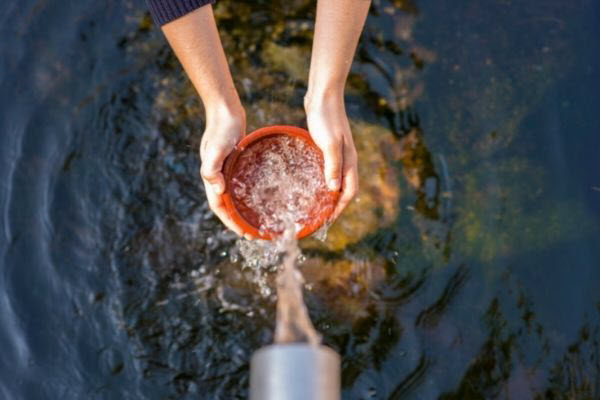Eco friendly dishwasher | What makes a dishwasher environmentally friendly?
My dishwasher is one of my best friends!
As a busy mom, I can tell you one of my least favorite chores at home is to wash the dishes! To be honest, I hate it! Needless to say that dishwashers are one of those appliances that I cannot live without, hence my detective work to find out more about eco friendly dishwashers!
Are they real? What makes a dishwasher eco-friendly? Am I having green dreams?

History tells us that dishwashers have entered American homes in the 1950s and have grown in popularity ever since. And by the 1980s, all newly built kitchens had a space for a dishwasher.
Like everything else, dishwashers have a carbon footprint! And so do their detergent and rinse aid!
The good news is that dishwashers are becoming increasingly energy and water efficient and are often considered more environmentally friendly than washing dishes by hand, provided you follow good non-wasteful steps.
What defines an eco-friendly dishwasher? Energy efficiency and water efficiency are a good starting point!
Energy Efficiency
This is a tricky one. About 80% of all energy use for dishwashers is about heating the water and not just about simply keeping it on.
So, the amount of water it is required for a load also has a great impact on how environmentally friendly your dishwasher is.
That brings us to water efficiency.
Water Efficiency
Water is a precious resource and, from time to time, in some parts of the world water becomes scarce and the need to use it moderately becomes a survival necessity. With dishwashers, energy used to heat large amounts of water will have an impact on its overall performance.
In short, going for a dishwasher model that saves on water will also save energy!
On average, a standard size dishwasher will use 4.2 gallons of water per load, but it is estimated the more efficient ones can go down to 3.2 gallons of water per load. Handwashing often uses way more water than that! And if you hand wash with hot water, you need energy!

Energy Star Rating System
If you are after an eco-friendly dishwasher a good start is to check its ‘energy star rating’. But what exactly is ‘energy star’?
Energy Star is an international rating system for energy efficiency that can easily tell you how household appliances compare when it comes to their energy consumption. It uses a combination of stars – the more the better – and colors – green is good, red is bad – to inform consumers about the efficiency of appliances on the market.
The Energy Star rating system is simple, reliable and is provided by a neutral unbiased organisation who is not the manufacturer of the appliance.
Instead of going to complex calculations of how many KW an appliance uses, you can check how many stars it has and if it has more or less stars than that other model you had a look at! Easy!
But what about water efficiency rating?
The Energy Star rating will take into account water usage to determine how efficient a dishwasher is. According to their website, they take into consideration things like soil sensors, water filtration, jets and rack designs – things that have an impact on energy and water consumption.

Apart from energy and water efficiency, there is another important factor when it comes to environmentally friendly dishwashers! That is us – consumers – and how we use our dishwasher.
Tips for Eco-friendly Dishwasher Use
All of the above is good news if you, like me, hate handwashing, however what makes a dishwasher environmentally friendly is also subject to how it is used!
Here are some tips on best-practice for dishwasher:
1 Always fully load your dishwasher. If you don’t have a full load, consider waiting until it is full! Another option, although not as good as waiting, is to use the cold rinse cycle.
2 Do not rinse beforehand! Extra rinsing means a lot more water consumption and that is exactly how an eco-friendly dishwasher becomes quite unfriendly! Older generation dishwashers required rinsing in order for your dishes to be thoroughly cleaned, however that is no longer the case. Dishwasher technology has dramatically improved in the last decade or so. It is enough to get rid of solid scraps before you load your dirty dishes.

3 Load your dishes thoughtfully. The dirtier ones should be closer to the jet sprays and always make sure the bulkier items are not blocking and stopping the water to reach all your dishes.
4 You dishwasher detergent and rinser are very important in order to keep our waterways clean. Phosphates, which are often present in detergents, can contribute towards excessive algae growth. And remember, natural does not always equal to best option. That is the case when using vinegar as dishwasher rinse aid as it could shorten the lifespan of your machine.
5 Repair, repair, repair and recycle! An eco-friendly dishwasher is one with a long-life! There is no doubt that costs associated with buying new parts and/or fixing broken bits can be high, but that is way less harmful for the planet than the disposal of a dishwasher. Of course, when things get beyond repair, dispose of it responsibly by recycling as much of your dishwasher as possible – yes, there are materials there that can be recycled and reused.
With these tips in mind, you can keep your dishwasher as your best helper around the house!






